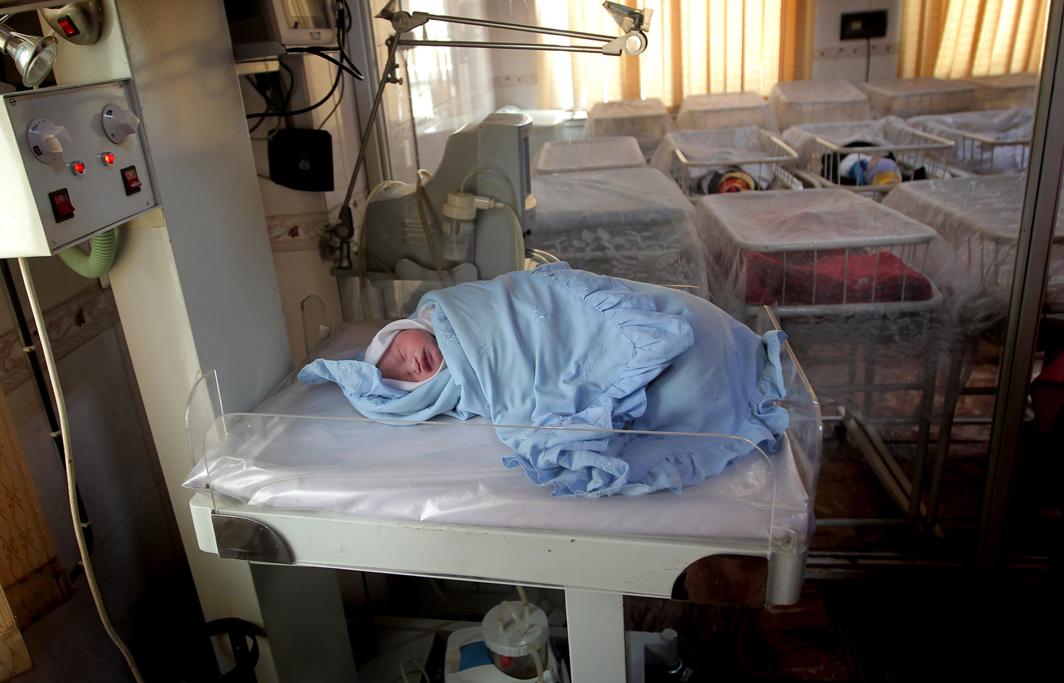Midwives key to health and survival of women and children
An Afghan newborn boy is wrapped in a towel after delivery in the maternity ward of a hospital in Kabul. Afghanistan has one of the highest maternal mortality rates in the world with an estimated 1,800 maternal deaths per 100,000 live births.
Note: This is a guest blog by Mary Ellen Stanton a Senior Maternal Health Advisor at USAID, and Chris Thomas, Global Health Communications and Policy Advisor at USAID about how midwives are a valuable a human resources solution for women and children's health.
This year, more than 350,000 women will die in pregnancy or childbirth and 8 million children will die of preventable diseases before their fifth birthday.
A new report, supported by the U.S. Agency for International Development, on the State of the World's Midwifery, concludes that more trained midwives could help save millions of lives by delivering babies safely, providing family planning, offering nutrition advice, and providing services for the prevention HIV/AIDS in countries with high death rates among newborns and women giving birth.
USAID’s maternal health work has demonstrated that many of the major causes of death are preventable and treatable with low-cost interventions. One key to a healthy delivery is ensuring skilled attendance at birth. USAID has long been a supporter of midwives as professional frontline health care providers. USAID trains and equips skilled midwives to provide quality care to women in labor and delivery, manage obstetric emergencies, and prepare community health workers who then educate mothers on preparing for birth and proper infant care.
While delivering the David E. Barmes Global Health Lecture at the National Institutes of Health in February, USAID Administrator Rajiv Shah lamented the plight of pregnant women in the developing world and called for change.
“I cannot escape the conclusion that our current state of affairs— where a pregnant African woman is 135 more times more likely to die during childbirth than her Western counterpart—exists simply because she is a woman,” he said. “To me, this is unacceptable—the death of a woman during childbirth is unacceptable—regardless of where it occurs.”
The U.S. Global Health Initiative has set ambitious targets like a 30% decrease in maternal mortality in assisted countries, with a priority on supporting innovation and sharing best practices, as well as building up the health systems that deliver these interventions.
To achieve this goal, USAID is focusing its efforts on 28 countries that contribute to 77% of the maternal deaths worldwide. USAID experts design programs that are grounded in research and informed by their understanding of each country’s unique challenges and cultural contexts.
Here are some examples of the programs that USAID has implemented:
In Guatemala, USAID has an innovative midwife training program that combines Western medicine and traditional Mayan culture. Mayan women have endured a deeply rooted history of inequality, suffering from illiteracy, early marriage, frequent pregnancies, and limited pre- and post-natal care. And, 60 percent of pregnant Mayan women have no access to skilled delivery attendants. USAID has trained 120 Mayan midwives, who now provide expectant mothers with medical care that could prevent over 75 percent of maternal deaths.
Afghanistan has one of the highest maternal mortality ratios in the world. With multi-donor support and a high-level commitment from the MoPH, the number of midwives in Afghanistan has increased from 467 in 2002 to more than 2,700 today. USAID has helped train 1,478 midwives and developed the midwifery education program utilized by 34 midwifery schools in 32 provinces. USAID programs in Afghanistan address illiteracy, poor health, extreme poverty, and political exclusion that bedevil the lives of Afghan women.
Despite progress, maternal mortality is still unacceptably high. We must continue to seize the momentum and enhance family planning and maternal health programs to quickly reduce the high toll of preventable maternal deaths, while also improving economic conditions, educating girls, and empowering women so they can plan their families and get the life-saving care they need during pregnancy and birth.
We want to hear your feedback so we can keep improving our website, theworld.org. Please fill out this quick survey and let us know your thoughts (your answers will be anonymous). Thanks for your time!
